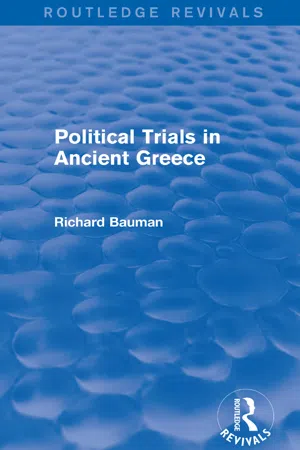
- 222 pages
- English
- ePUB (mobile friendly)
- Available on iOS & Android
Political Trials in Ancient Greece (Routledge Revivals)
About This Book
During the inspired years of the Athenian empire, through the tragedy of its collapse, to the more prosaic era that followed, most of the great names in Athenian history were involved in the procedures of criminal law. Political Trials in Ancient Greece, first published in 1990, explores the relationships between historical process, constitution, law, political machinations and foreign policy, concentrating on fifth and fourth century Athens and on Macedonia.
These trials contribute significant details to our knowledge of such towering figures as Aeschylus, Pericles, Thucydides, Alcibiades, Socrates, Demosthenes and Aristotle, as well as a diverse collection of Macedonian defendants. The jurisdiction of the Areopagus, trials of communities, and the personal jurisdiction of the Macedonian king are also examined. Richard Bauman's original account broadens our understanding of Greek legal institutions and of the ancient Greek approach to the law, as well as the general ethos of Athenian and Macedonian society.
Frequently asked questions
NOTES
I INTRODUCTION
Table of contents
- Cover
- Half Title
- Title Page
- Copyright Page
- Original Title Page
- Original Copyright Page
- Table of Contents
- Preface
- I Introduction
- II Fifth-Century Athens: Early Empire-Builders and the Courts
- III Fifth-Century Athens: The Judicial Sovereignty of the Demos
- IV Fifth-Century Athens: ‘Whom the Gods Wish to Destroy’
- V Fourth-Century Athens: Law Reform, Scrutiny, and Illegality
- VI Fourth-Century Athens: Asebeia, the Willing Work-Horse
- VII Alexander in Asia
- VIII From Perdiccas to Poliorcetes
- Abbreviations
- Notes
- Select bibliography
- Index